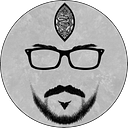DO YOU REALLY WANT THELEMA TO GET RID OF MAGICK?
Don’t we already have enough secular religions for those leaning into the dull and grey aspects of existence?
Recently, I conducted a poll on Twitter and Instagram, posing a thought-provoking question to the community:
Do people prefer Thelema to be perceived as “Magico-Mystical” or “Stern & Materialistic”?
The inquiry aimed to gauge contemporary sentiments towards Thelema, a spiritual philosophy introduced by Aleister Crowley, that has sparked diverse interpretations over the years. This question touches on a deeper dialogue about the nature of spirituality in our modern age, where materialism and rationalism often overshadow the mystical and magical aspects of existence.
The philosophy of Thelema, with its core maxim, “Do what thou wilt shall be the whole of the Law,” offers a deep spiritual framework that transcends mere hedonism, urging individuals to discover and fulfil their True Will — their unique purpose. In a world increasingly characterised by disenchantment, Thelema stands as a beacon of re-enchantment, providing a pathway back to the spiritual, the mystical, and the magical. It invites practitioners to see the world not just as a physical reality but as a divine play, imbued with meaning at every turn, where each action can be a sacred ritual and every moment an opportunity for spiritual awakening.
The debate between viewing Thelema as “Magico-Mystical” versus “Stern & Materialistic” reflects broader discussions about the role of spirituality in contemporary society.
While Crowley’s advocacy of Scientific Illuminism and statements such as “There is no God but Man” from Liber Oz might suggest a materialistic or atheistic leaning, these aspects do not fully capture Thelema’s spiritual essence.
Crowley’s emphasis on empirical inquiry and personal sovereignty was a challenge to the dogmas of his time, proposing a spirituality that is both meaningful to the individual and anchored in reality. Yet, this rational approach does not negate the mystical depth of Thelema, which remains crucial for those seeking to navigate the complexities of the modern world.
In these challenging times, marked by global upheaval and existential threats, a purely materialistic worldview offers little in the way of solace or guidance. Thelema, with its magico-mystical foundation, presents an invaluable spiritual framework. It recognises the divinity within and around us, advocating for a life lived in holistic engagement with both the seen and the unseen. This path of personal empowerment and transformation, centred on the pursuit of one’s True Will, can lead to a deeper understanding of oneself and the cosmos.
Moreover, Thelema’s inclusive and pluralistic view of divinity, which sees every individual as a unique star in the infinite night sky, fosters a sense of unity and interconnectedness. This vision of the divine within each person and the sacredness of all life offers a powerful antidote to the alienation and fragmentation of modern society. It calls for a re-enchantment of the world, where magic and mysticism are not marginalised but are integral to our understanding of life and our place within it.
The responses to the poll reflect a longing for a spiritual approach that embraces the magico-mystical, highlighting a collective desire for re-enchantment in a disenchanted world.
While acknowledging the value of rational inquiry and personal autonomy, the essence of Thelema as a deeply spiritual, magico-mystical path offers a beacon of hope and transformation. In embracing this vision of Thelema, we open ourselves to a more spiritually fulfilling existence, transcending the limitations of a materialistic worldview and rekindling a sense of wonder and connection to the divine.
In the face of contemporary challenges, Thelema reminds us of the importance of pursuing our True Will and re-enchanting our perception of the world for the well-being of both the individual and society at large.
In closing, it is crucial to remember that while embracing the re-enchantment and magico-mystical approach of Thelema, we must be cautious not to fall into the trap of spiritual bypassing. True spiritual growth involves confronting and integrating the shadow aspects of ourselves and society, not merely transcending them through esoteric or mystical practices.
At the same time, stripping Thelema of its core component — magick — renders it impotent and feeble when compared to other philosophies. The groundbreaking power and appeal of Thelema lie in its capacity to reintroduce a mythical element into our increasingly soulless society, offering not just a philosophy but a lived experience that connects us to the profound and the numinous.
This balance between mystical engagement and grounded self-work ensures that Thelema remains a potent force for personal and collective transformation, rekindling the sacred fire in a world that yearns for meaning and connection.
